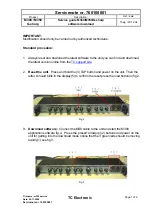
40-20
Catalyst 3750-E and 3560-E Switch Software Configuration Guide
OL-9775-08
Chapter 40 Configuring IP Unicast Routing
Configuring RIP
This example shows how to enable IP routing using RIP as the routing protocol:
Switch#
configure terminal
Enter configuration commands, one per line. End with CNTL/Z.
Switch(config)#
ip routing
Switch(config)#
router rip
Switch(config-router)#
network 10.0.0.0
Switch(config-router)#
end
You can now set up parameters for the selected routing protocols as described in these sections:
•
•
•
•
•
Configuring Unicast Reverse Path Forwarding, page 40-90
•
Configuring Protocol-Independent Features, page 40-90
(optional)
Configuring RIP
The Routing Information Protocol (RIP) is an interior gateway protocol (IGP) created for use in small,
homogeneous networks. It is a distance-vector routing protocol that uses broadcast User Datagram
Protocol (UDP) data packets to exchange routing information. The protocol is documented in RFC 1058.
You can find detailed information about RIP in
IP Routing Fundamentals,
published by
Cisco Press.
Note
RIP is the only routing protocol supported by the IP base feature set; other routing protocols require the
switch or stack master to be running the IP services feature set.
Using RIP, the switch sends routing information updates (advertisements) every 30 seconds. If a router
does not receive an update from another router for 180 seconds or more, it marks the routes served by
that router as unusable. If there is still no update after 240 seconds, the router removes all routing table
entries for the non-updating router.
RIP uses hop counts to rate the value of different routes. The hop count is the number of routers that can
be traversed in a route. A directly connected network has a hop count of zero; a network with a hop count
of 16 is unreachable. This small range (0 to 15) makes RIP unsuitable for large networks.
If the router has a default network path, RIP advertises a route that links the router to the pseudonetwork
0.0.0.0. The 0.0.0.0 network does not exist; it is treated by RIP as a network to implement the default
routing feature. The switch advertises the default network if a default was learned by RIP or if the router
has a gateway of last resort and RIP is configured with a default metric. RIP sends updates to the
interfaces in specified networks. If an interface’s network is not specified, it is not advertised in any
RIP update.
These sections contain this configuration information:
•
Default RIP Configuration, page 40-21
•
Configuring Basic RIP Parameters, page 40-21
•
Configuring RIP Authentication, page 40-23
•
Summary of Contents for Catalyst 3750-E Series
Page 48: ...Contents xlviii Catalyst 3750 E and 3560 E Switch Software Configuration Guide OL 9775 08 ...
Page 52: ...lii Catalyst 3750 E and 3560 E Switch Software Configuration Guide OL 9775 08 Preface ...
Page 1414: ...Index IN 58 Catalyst 3750 E and 3560 E Switch Software Configuration Guide OL 9775 08 ...
















































